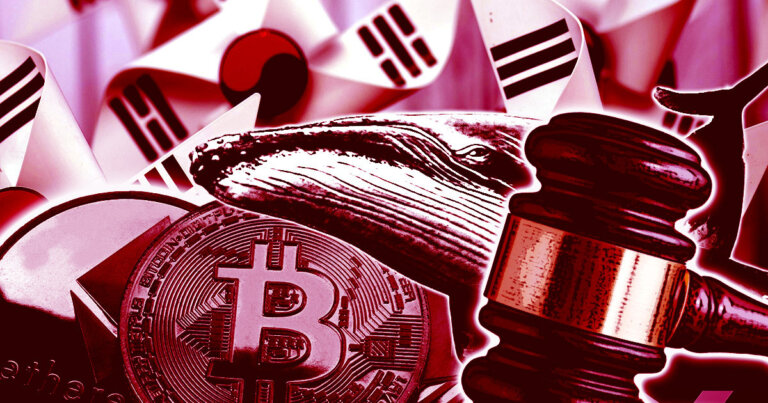 South Korea’s financial watchdog to monitor crypto whales on adherence to anti-money laundering laws
South Korea’s financial watchdog to monitor crypto whales on adherence to anti-money laundering laws South Korea’s financial watchdog to monitor crypto whales on adherence to anti-money laundering laws
South Korea's Financial Services Commission will look into virtual asset exchanges and customers who hold significant portions of single-listed coins and stablecoins to prevent money laundering.

Cover art/illustration via CryptoSlate. Image includes combined content which may include AI-generated content.
The Financial Services Commission (FSC), South Korea’s financial regulator, will monitor the country’s largest crypto holders after raising concerns about the high risk associated with money laundering single-asset virtual assets and stablecoins, according to local media reports.
The decision is made to subject virtual asset operators, businesses, and individuals who hold over $70,000 worth of digital assets to the purview of the Financial Intelligence Unit, a division of the FSC.
The other types of virtual asset holders that will also fall under the scrutiny of the FSC include electronic financial companies, online investment-linked financial companies, and loan companies.
In addition, customers who deposit significant amounts of digital assets will be monitored and evaluated to see if the transactions could breach anti-money laundering laws.
The FSC argues that based on the number of virtual assets held by each customer multiplied by the closing price of the virtual assets at the end of the quarter, it is necessary to monitor the size and fluctuations of such assets.
The decision was made as a result of a report obtained by news1 KR, titled “Risk assessment index development, improvement and application methods study for new business areas,” which has shaped the FSC’s stance on regulating crypto exchanges and holders. The report was prepared to develop evaluation indicators for new businesses that require money laundering assessment. The FSC received the final report in the form of a research service report in June.
FSC deems that the greater the proportion of single-listed virtual assets and stablecoins on virtual asset exchanges, the higher the risk of money laundering or being used as a means of crime.
The FSC’s announcement coincides with its chairman, Kim Joo-hyeon’s remarks made on 24. Oct, while attending the general audit of the Political Affairs Committee. He stated that he will review the feasibility of creating and imposing a standardized transaction plan for different coin transfer limits for each virtual asset exchange. He added that he will also review whether a standardized bill besides anti-money laundering can be made.








































































































